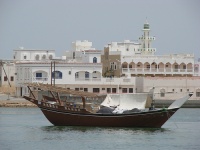Airport
Muscat International Airport
IATA Code: MCTLocation: The airport is located 20 miles (32km) west of Muscat city centre.
Time: GMT +4.
Contacts: Tel: +968 2451 9223, +968 2451 8030.
Transfer to the city: Taxis cost OMR 10 and are available outside the terminal building. Otherwise Minibuses run from the highway just outside the airport to Ruwi every 10 minutes throughout the day for 300 fils.
Taxis: Taxies from Muscat International Airport can be found outside the arrivals hall. Payment can be made before the ride at the taxi counter outside of arrivals. They have a convenient fare chart for major hotels and the cost is usually under 10 Omani Rial for the 20 mile (32 km) ride to the city centre. Taxies are also available for transport to other cities inside Oman.
Car rental: Car rental facilities are available in the Public Concourse outside the Arrival Area.
Facilities: Seeb Airport is currently being enlarged and improved. There is a currency exchange bureau, food courts in the arrivals and departures section, a large, well-stocked duty free shop also in both arrivals and departures, and a book shop. There are public telephones, a prayer room and left luggage facilities.
Parking: Short and long term pay-park facilities are available in front of the terminal building.
Departure tax: OMR 5 for all departures (usually collected when ticket is issued).
Website: www.omanairports.com
Visit worldtravels.com for the full guide to Muscat. Build a complete Muscat travel guide and email to your clients - sign up for a trial subscription of World Travels Pro.
Muscat

Muscat is the largest city in Oman, but the bustle of the modern capital city is easily forgotten with rug merchants, cannon-protected forts and an ornate sultan's palace overlooking the historic city harbour. The once important maritime city underwent a resurgence in the 1970s, when the Sultan Qaboos bin Said began to develop museums, mosques, palaces, and to restore relics of Muscat's history. Although Muscat is a popular destination for sightseeing tourists, many of the attractions are primarily regular fixtures of Omani life. The mosques are important religious sites, the ancient forts are still operated by the military and the palace is the seat of Oman's government. While this gives visitors an authentic experience, tourists can find playing second fiddle a little inconvenient. The beauty of the city, especially near the harbour, is what makes Muscat so alluring. The smooth curved stone architecture is a transition from the rocky landscape to the inviting water of the harbour. Many new buildings have continued with classic Arabic architecture, further protecting the city's legacy from the ravages of the modern world. Muscat is one of the safest, most cosmpolitan and open-minded city in the entire Gulf Region, and is fast becoming a Middle East tourism hotspot.







